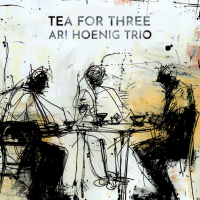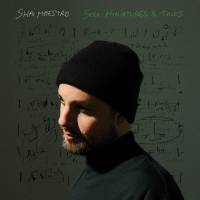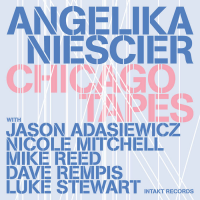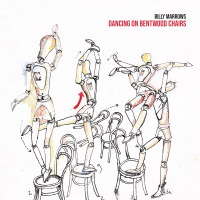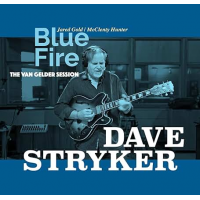Home » Jazz Articles » Album Review » Ari Hoenig: Tea For Three
Ari Hoenig: Tea For Three
In Hoenig's case, his presence on this sub-label reflects more his long-standing relationship with the Catalan producer than any newcomer status, a partnership which now spans a decade and nearly ten albums. The drummer, with a professional career stretching back a quarter of a century, is a fully established figure, though perhaps underappreciated by the modest yet vital jazz media spotlight. Lehavi and Tiberio, however, fit the label's ethos more naturally: The phenomenal Israeli pianist, based in New York, and the excellent New Yorker bassist are both still under 30. For the former, it is enough to recall that someone so little suspected of unfounded enthusiasm as Dave Liebman once described him—at just 13—as "from another planet." From prodigious promise to tangible reality, the pianist has played with Ravi Coltrane, Melissa Aldana and Kurt Rosenwinkel, to name a few, and currently leads or co-leads two trios. The bassist, meanwhile, has become a key presence on the NYC scene, collaborating with contemporary new stars like Joel Ross, Immanuel Wilkins, Jazzmeia Horn and Johnathan Blake.
With this album, the leader establishes his own 'art of the trio,' refining his impulses, experiences and influences with stunning results. He deepens the formula used in the two previous albums by this 'American' trio, blending original compositions with venerable standards and modern jazz milestones, often approached with rhythmically unorthodox treatments (for instance, check out the unrecognizable "Prelude To A Kiss" on Conner's Days or the disorienting, larghissimo-paced "Cherokee" on Golden Treasures.) Yet if there is a dominant impression—especially in the first two tracks of this beautifully presented digipak—it is the echo of his work with Jean-Michel Pilc's extraordinary trio, as well as an evident admiration for similarly Frenchified outfits, such as Pierre de Bethmann's Prysm band. Hoenig's ensemble shares their athletic, elastic rhythmic drive and their taste for angular harmonic and melodic exploration, all within a boldly reimagined but respectful jazz orthodoxy.
"Condemnation," the album's opening track, transforms its ominous ostinato into a mesmerizing labyrinth of breaks, stop-and-run passages and metric games, previewing a key thread throughout: the leader's crisp, imaginative, ever-present drumming—assertive but never intrusive. "Hold Up A Minute" continues in a similar vein, shifting from a funky urban feel to unapologetic swing, propelled by a kind but taut vibe worthy of Herbie Hancock.
By this point, it is undeniable that the listener's attention must be constantly divided among the trio's members. "Nominor" opens with Tiberio's oily bass line, patiently building a gentle crescendo as he alternates the spotlight with a dazzling Lehavi. The Tel Aviv native's ravenous pianism links Hancock to early-Atlantic-era Keith Jarrett, though traces of Miles Davis's Second Great Quintet loom even larger here. In sharp contrast, the leader introduces "Alone," the album's first ballad—an original piece that triumphs through its sincere simplicity, eschewing unexpected chord changes or intricate lines. A subtle cymbal play passionately emphasizes the raw beauty of a song imbued with timeless classicism. "You Stepped Out of a Dream," the first standard submitted for debate, receives a clean, mainstream treatment reminiscent of the most restrained Oscar Peterson, while syncopated tension returns in "Theo's Groove," one of the album's most fascinating tracks: a simple motivic idea unfolds with brilliance—Prysm, Hancock, and the Davis quintet again noticeably referenced—in a cut that is actually a vamp successively modified by various moods and rhythmic treatments. The pianist quotes "Things Ain't What They Used to Be" in his spirited solo, before the piece erupts into a thrilling, percussive climax.
There is not a single weak link in this meticulously crafted album. Listener tastes and preferences can affect the reception of some tracks that veer from the album's main stylistic current—like "Irish Golem" or "Fatti Mi Me"—but the commitment in their conception and execution leaves no room for disappointment. A similar case is "Tea for Two," the Vincent Youmans-Irving Caesar classic, rejuvenated here with deceptively gentle waltz-like beginnings before sliding into nervy walking and evolving into a wonderfully accurate effort, punctuated by a loquacious, in-the-tradition Lehavi, a concise Tiberio and, finally, a standout Hoenig speech. The comparison with the version on the underrated Live At Sweet Basil, Vol. 1 (A-Records, 2000), featuring the drummer working in Pilc's trio, is as inevitable as it is illustrative.
The album closes with two apparent curiosities, though they are hardly surprising for those familiar with the Philadelphian's career. "Work Song" takes us back to his early experimental solo albums, where he played well-known melodies on drums alone, with occasional vocal support—demanding that listeners already know the tune to fully appreciate the performance. This approach, though less radical over time, remains part of his artistic voice. Here, the Nat Adderley evergreen eventually opens up to the full trio, although Hoenig takes charge of both its launch and resolution. Finally, "For Tracy"—a sweet miniature dedicated to his wife—hints at "A Time for Love." In this piece, the leader sets aside his sticks and convincingly delivers a tender vocal rendition in a high register, in a duo with a reserved Lehavi.
Alon Benjamini's recording and mix capture the trio's exuberant ecosystem to perfection, integrating each element so seamlessly that one can feel them like the biologically interconnected limbs of a single organism—one specifically designed to produce music that is fiercely contemporary while deeply rooted in tradition. Beyond his prowess as an instrumentalist, Hoenig reveals himself as a composer worth following—a fact recognized by pianist and big band leader Ben Markley, who featured several of his pieces in Ari's Funhouse (OA2 Records, 2022), framing them in the context of a buoyant, expansive big band setting. Other works of his also appear in Enchanted (Fresh Sound New Talent, 2023), the drummer's collaborative 'European' trio with Tom Ollendorff and Conor Chaplin. But beyond these somehow collateral ramifications, Tea For Three—and, in essence, this magnificent ensemble—leaves us hungry, so we can't help but wait with disciplined anxiety for their hypothetical, yet undoubtedly fruitful, next studio collaboration.
Track Listing
Condemnation; Hold Up A Minute; Nominor; Alone; You Stepped Out Of A Dream; Theo's Groove; Irish Golem; Tea For Two; Fatti Mi Me; Work Song; For Tracy.
Personnel
Album information
Title: Tea For Three | Year Released: 2024 | Record Label: Fresh Sound New Talent
Tags
PREVIOUS / NEXT
Ari Hoenig Concerts
Support All About Jazz
 All About Jazz has been a pillar of jazz since 1995, championing it as an art form and, more importantly, supporting the musicians who make it. Our enduring commitment has made "AAJ" one of the most culturally important websites of its kind, read by hundreds of thousands of fans, musicians and industry figures every month.
All About Jazz has been a pillar of jazz since 1995, championing it as an art form and, more importantly, supporting the musicians who make it. Our enduring commitment has made "AAJ" one of the most culturally important websites of its kind, read by hundreds of thousands of fans, musicians and industry figures every month.


